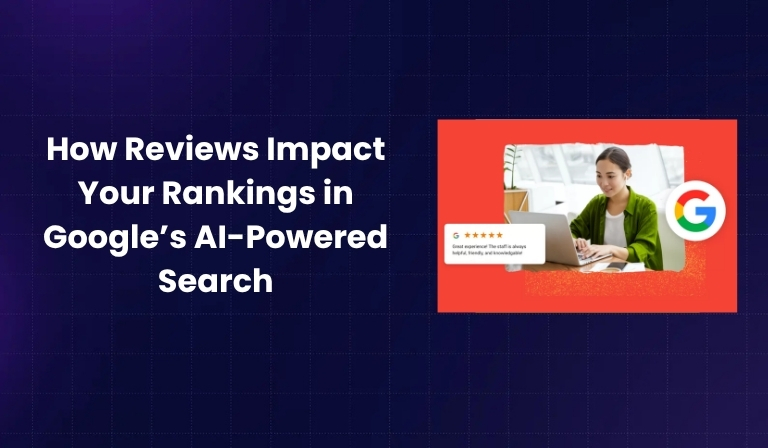As Google’s search experience evolves with AI, the role of reviews is changing fast. Today, customer reviews are not just helpful feedback—they are powerful ranking signals in Google’s AI-powered search. Whether you run a small local business or manage enterprise-level SEO, understanding how reviews affect your visibility is essential.
In this blog, we’ll explore how reviews impact your search performance in the AI era and what you can do to stay ahead.
Why Reviews Are Now Critical for Search Visibility
Google is shifting toward AI Overviews (AIOs)—automated answers built using AI and large language models. These summaries pull content from trustworthy websites, user-generated content, and real reviews.
That means reviews are now playing a big role in:
- Deciding if your brand gets featured in AIOs
- Boosting visibility in the local pack
- Helping users (and Google) trust your business faster
If your reviews aren’t optimized, you risk becoming invisible in the new AI-powered search world.
Reviews Are the New Gatekeeper for AI Search Inclusion
Google’s AI is designed to surface helpful, people-first content. Reviews offer real user experiences, which Google’s AI sees as more trustworthy than salesy website copy.
Google uses reviews to:
- Understand what your business does
- Measure customer satisfaction
- Verify local relevance
In AI Overviews, reviews are often quoted directly. If your business has fresh, detailed, and positive reviews, you’re more likely to be included in AI-powered answers.
Recency & Relevance: What Google’s AI Prioritizes
Google isn’t just counting your reviews—it’s reading them. Two major factors that impact your visibility are:
- Recency
Fresh reviews show that your business is active and trustworthy. A review from last week is far more valuable than one from two years ago.
- Relevance
Google looks for keywords, topics, and context. For example, if a customer says, “The gluten-free pizza was amazing,” and someone searches for “best gluten-free pizza near me,” your business is more likely to show up.
Do Star Ratings Still Matter? Yes, But Differently
Star ratings are still important—but mostly as a decision shortcut for users.
While AI Overviews prioritize the content of reviews, star ratings influence:
- Whether users click on your result
- Trust perception at a glance
- Conversion rates from search
So, while Google may not rank you higher just for having a 5-star rating, users might choose your listing over others because of it.
Why Both First-Party and Third-Party Reviews Matter
Not all reviews are equal. Google pulls data from many sources. Here’s why you need both:
First-Party Reviews
These are reviews collected directly on your website. They help with:
- On-site SEO
- Product trust
- Adding rich snippets using schema
Third-Party Reviews
These appear on platforms like:
- Google Business Profile
- Yelp
- G2, Capterra, Trustpilot
- Facebook and industry-specific directories
Google trusts these platforms and often pulls review content from them into AIOs. Having good reviews across these platforms helps you build credibility.
Google’s AI Uses More Than Just Google Reviews
You might think Google only relies on reviews from Google Business Profile—but that’s not true anymore.
In the AI search era, Google collects information from:
- Yelp
- TripAdvisor
- Trustpilot
- G2 and Capterra
- Niche-specific sites (e.g., Houzz, Healthgrades)
If you’re not active on these platforms, you might be missing out on visibility in AIOs and organic search.
Responses to Reviews Build Trust & Boost Visibility
Did you know that replying to reviews can help your rankings?
Google’s AI looks at your review responses to:
- Understand how engaged your business is
- Measure your tone and professionalism
- Gauge your commitment to customer satisfaction
How to respond effectively:
- Be timely: Respond within 24–48 hours.
- Be specific: Address the customer’s feedback directly.
- Use keywords: Naturally mention products or services when appropriate.
- Be professional and polite, even in response to negative feedback.
How Agencies & Brands Should Integrate AIO Into Their Review Strategy
If you’re a marketing agency or managing SEO for a brand, you need to build reviews into your search strategy. Here’s how:
For Local Pack Optimization
- Ensure your Google Business Profile is complete
- Add relevant categories, services, and photos
- Use keywords in your business description
- Encourage keyword-rich local reviews
For AIO Inclusion
- Use schema markup to display first-party reviews on your site
- Include review snippets on key pages
- Monitor mentions and reviews across all platforms
- Align your content strategy with topics users mention in reviews
Also Check: International SEO: Best Practices for Global Online Success
Reputation Management = SEO in the AI Era
Reputation management is no longer separate from SEO. It’s one of the main signals AI uses to determine:
- Whether your business is trustworthy
- What your brand is known for
- If you’re worth showing in AIO or featured snippets
This means:
- Your online sentiment matters
- You need to track and manage reviews regularly
- Negative reviews that go unaddressed can hurt your visibility
Tools you can use:
- Google Alerts (basic monitoring)
- Reputation management tools like GatherUp, ReviewTrackers, Podium
- Manual review checks on major platforms
How To Stay Visible in the AI-Powered SERPs
To stay visible, you must actively manage, encourage, and respond to reviews. Here are actionable steps:
1. Encourage detailed reviews
Ask customers to mention what service/product they used and how it helped them.
2. Don’t fake it
Google’s AI can detect patterns of fake reviews. Always encourage honest feedback.
3. Use reviews in your content
Display testimonials or snippets on landing pages, service pages, or product listings.
4. Monitor all platforms
Set up alerts or use tools to track what’s being said about your brand.
5. Optimize for EEAT
High-quality reviews show:
- Experience (what the user went through)
- Expertise (how well your service/product performed)
- Authority (mentions across review sites)
- Trustworthiness (engagement through replies)
Final Thoughts
Search is changing—and reviews are right at the center of it. They’re no longer just a nice-to-have. They are a major part of how your business is found, evaluated, and trusted in Google’s AI-powered ecosystem.
Key Takeaways:
- Reviews now influence both ranking and trust
- AIOs pull data from many review platforms
- Recency, relevance, and responses matter
- Reputation = visibility in the AI age
If you want to thrive in this new search landscape, make sure your reviews are working for you—not against you.
FAQs
1. What is an AIO (AI Overview)?
AIO stands for AI Overview, a new feature in Google Search powered by generative AI. It gives users summarized answers at the top of search results, using information pulled from websites, reviews, and other trusted sources.
2. Do reviews directly impact my rankings in Google’s AI search?
Yes. Google uses review content to evaluate your relevance, trustworthiness, and user experience, which can influence whether your business appears in AI Overviews or the local pack.
3. Which review platforms matter most to Google’s AI?
Besides Google Reviews, platforms like Yelp, Trustpilot, TripAdvisor, G2, Capterra, and industry-specific review sites are frequently referenced by AI for building summaries and search answers.
4. How do I get more high-quality reviews?
Ask customers at the right moment (usually after a positive experience), make it easy for them to leave a review, and encourage them to mention specifics—such as the product or service used.
5. Do negative reviews hurt my ranking?
A few negative reviews won’t hurt much if you have many positive ones. But consistent negative sentiment that goes unaddressed can lower your trust score and impact visibility.
6. Is replying to reviews really necessary?
Yes. Google’s AI considers how businesses engage with customers. Thoughtful and timely replies show you care and help build trust with both users and Google.
7. How often should I monitor my reviews?
At least once a week. For active businesses, daily monitoring is ideal—especially if you receive frequent customer feedback.
8. Can I delete bad reviews?
You can flag reviews that are fake, offensive, or violate platform guidelines—but you can’t remove genuine negative reviews. It’s best to respond professionally and show improvement.
9. Should I collect reviews on my own website or use third-party platforms?
Both are important. First-party reviews (on your site) help with SEO and conversions. Third-party reviews (on Google, Yelp, etc.) increase your trust signals in AI rankings.
10. Do star ratings affect search rankings?
Star ratings mainly influence user behavior, like clicks and conversions. While they don’t directly boost rankings, they affect your visibility and perceived credibility.
11. Can I use review content in my website’s SEO strategy?
Absolutely. Use customer quotes, testimonials, and review snippets to add real user content to your service or product pages. This improves on-page SEO and trust.

